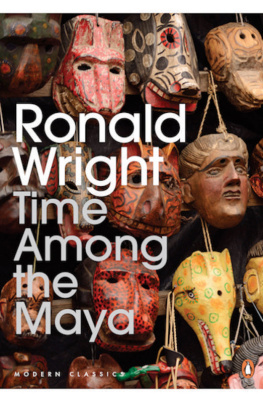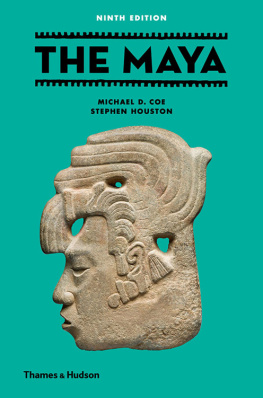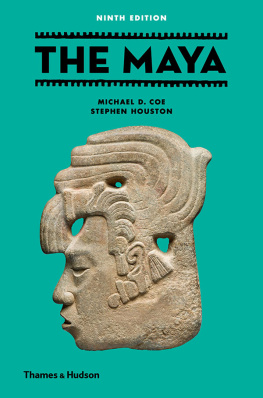the only true people
the only true people
Linking Maya Identities Past and Present
Edited by
Bethany J. Beyyette and Lisa J. LeCount
University Press of Colorado
Boulder
2017 by University Press of Colorado
Published by University Press of Colorado
5589 Arapahoe Avenue, Suite 206C
Boulder, Colorado 80303
All rights reserved
Printed in the United States of America

The University Press of Colorado is a proud member of The Association of American University Presses.
The University Press of Colorado is a cooperative publishing enterprise supported, in part, by Adams State University, Colorado State University, Fort Lewis College, Metropolitan State University of Denver, Regis University, University of Colorado, University of Northern Colorado, Utah State University, and Western State Colorado University.
This paper meets the requirements of the ANSI/NISO Z39.48-1992 (Permanence of Paper).
ISBN: 978-1-60732-566-6 (cloth)
ISBN: 978-1-60732-567-3 (ebook)
Library of Congress Cataloging-in-Publication Data
Names: Beyyette, Bethany J., editor. | LeCount, Lisa J. (Lisa Jeanne), 1955 editor.
Title: "The only true people" : linking Maya identities past and present / edited by Bethany J. Beyyette, Lisa J. LeCount.
Description: Boulder : University Press of Colorado, [2017]
Identifiers: LCCN 2016040704| ISBN 9781607325666 (cloth) | ISBN 9781607325673 (ebook)
Subjects: LCSH: MayasEthnic identity.
Classification: LCC F1435.3.E72 O55 2017 | DDC 305.89742dc23
LC record available at https://lccn.loc.gov/2016040704

An electronic version of this book is freely available, thanks to the support of libraries working with Knowledge Unlatched. KU is a collaborative initiative designed to make high-quality books open access for the public good. The open access ISBN for the PDF version of this book is 978-1-60732-699-1; for the ePUB version the open access ISBN is 978-1-60732-721-9. More information about the initiative and links to the open-access version can be found at www.knowledgeunlatched.org.
Front cover illustrations, top to bottom: Motul Dictionary (courtesy of the John Carter Brown Library); Mount Maloney type bowl from Actuncan (photo by Lisa LeCount); Caste War defense work in Iturbide (photo by Ute Schren); Creation Tablet from Palenque (rubbing by Merle Greene Robertson); Caste War fortifications in Bacalar (photo by Ute Schren); Talking Cross in Felipe Carrillo Puerto (photo by Wolfgang Gabbert)
Contents
Jonathan D. Hill
Bethany J. Beyyette
C. Mathews Samson
Juan Castillo Cocom, Timoteo Rodriguez, and Mccale Ashenbrener
Charles Andrew Hofling
Matthew Restall and Wolfgang Gabbert
Martha J. Macri
Lisa J. Lecount
Damien B. Marken, Stanley P. Guenter, and David A. Freidel
Marcello A. Canuto and Ellen E. Bell
Rebecca Storey
Edward Schortman
Foreword
JONATHAN D. HILL
In The Only True People: Linking Maya Identities Past and Present, Bethany Beyyette and Lisa LeCount have assembled the works of ethnologists, linguists, and archaeologists to critically rethink the complex interrelations between contemporary Maya identities and those known through archaeological studies of ancient Mayan sites. In the waning years of the twentieth century and the first decades of the twenty-first century, indigenous Mayan peoples have shown a remarkable ability to embrace new technologies and create new forms of political organization for representing their interests among themselves and at state, regional, national, and global levels. These indigenous forms of political and cultural creativity are unfolding today in contexts of the globalizing nation-states of Latin America and across the long-term historical processes of Colonial and national state expansion as well as associated traumatic losses of life, autonomy, land, and other resources.
Rapid intergenerational shifts are unfolding in villages, towns, and cities across Mesoamerica and the rest of Latin America as indigenous peoples move from oral traditions to literacy and from word of mouth to the Internet in a matter of years. Researching these contemporary transformations and the emergence of new forms of identity politics has become a rich field of study for ethnologists and historians (see, e.g., Warren and Jackson 2002 ; Ramos 1998 ). Because of their concern for documenting ethnogenesis and other long-term historical processes, including not only socio-cultural and historical but also linguistic and archaeological lines of inquiry, the essays that make up The Only True People are directly relevant to the rapidly changing cultural politics of indigeneity in Mesoamerica. The past lives on in the present in a diversity of ways, and the struggles of todays Mayan peoples to create new political and cultural spaces for persisting within the globalizing nation-states of Mesoamerica are both shaped by and give new form and meaning to cultural transformations that have been under way in the region for at least two millennia.
As wrong as it would be to ignore the momentous historical events and forces of Colonial and national state expansions in Latin America while trying to understand contemporary indigenous forms of creativity and identity, it would be just as incorrect to assert that these contemporary practices have little or no relevance for understanding long-term processes that have been unfolding in Mesoamerica for at least two millennia and that pre-contact Mayan peoples lived in some pristine, prehistoric state of nature. The concept of ethnogenesis, first used in a Latin American context by Norman Whitten (1976) and later developed in History, Power, and Identity ( Hill 1996 ) and other works ( Anderson 1999 ; Galloway 1995 ; Restall 2004 ; Hornborg 2005 ; Fennell 2007 ; Hornborg and Hill 2011 ), offers a way out of the essentializing of peoples without history, whether in past or present times. This approach is rooted in Fredrik Barths (1969) pioneering approach to social differentiation as a process of ethnic boundary marking and also builds upon Edward and Rosamond Spicers (1992 ) concept of persistent identity systems that have endured across centuries of Colonial domination.
More recently, James ).
Ethnogenesis, when defined in broad terms as a concept encompassing peoples simultaneously cultural and political struggles to create enduring identities in general contexts of radical change and discontinuity ( Hill 1996 :1) as well as peoples historical consciousness of these struggles, allows for an integrated historical, linguistic, and archaeological approach to studies of pre- and post-contact transformations of indigenous Mayan social identities and cultural landscapes. While acknowledging the profound changes brought about by European colonization and the rise of independent nation-states, the chapters of The Only True People also avoid essentializing approaches that categorize pre-contact Mayans as peoples without history or post-contact indigenous identities as merely artificial reinventions of past cultures.








 The University Press of Colorado is a proud member of The Association of American University Presses.
The University Press of Colorado is a proud member of The Association of American University Presses. An electronic version of this book is freely available, thanks to the support of libraries working with Knowledge Unlatched. KU is a collaborative initiative designed to make high-quality books open access for the public good. The open access ISBN for the PDF version of this book is 978-1-60732-699-1; for the ePUB version the open access ISBN is 978-1-60732-721-9. More information about the initiative and links to the open-access version can be found at www.knowledgeunlatched.org.
An electronic version of this book is freely available, thanks to the support of libraries working with Knowledge Unlatched. KU is a collaborative initiative designed to make high-quality books open access for the public good. The open access ISBN for the PDF version of this book is 978-1-60732-699-1; for the ePUB version the open access ISBN is 978-1-60732-721-9. More information about the initiative and links to the open-access version can be found at www.knowledgeunlatched.org.